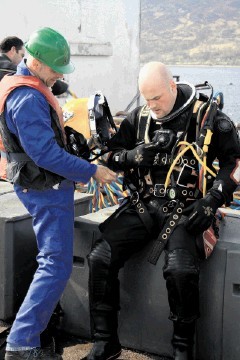
Around 700 newcomers to Scotland’s energy industry could get access to essential training and skills as a result of a £2million Energy Challenge Fund, managed on behalf of the Scottish Government by Skills Development Scotland.
Key organisations including Subsea UK, The Underwater Centre and Opito have been awarded a substantial share of the pot to attract new entrants and help people diversify their skills.
The funding will be used to develop tailored courses designed to fast-track people into the industry. It will also help new graduates or school-leavers fill energy-related vacancies in the industry by providing courses in essential disciplines such as diving and offshore safety.
The oil and gas industry is experiencing shortages of skills across a number of key areas. A recent survey of Subsea UK members revealed that the subsea industry in the UK needs around 10,000 people in the next 12 months to cope with current and short-term future demand.
Neil Gordon, chief executive of Subsea UK, said of the initiative: “The funds will go towards further developing a subsea engineer conversion course which provides companies with the course framework, tools and resources to successfully train engineers from other sectors to become subsea engineers.
“One of Subsea UK’s members, Subsea7, is among those running their own engineering conversion programmes and through the Subsea UK leadership forum. Another, Bibby Offshore, recently launched its scheme and the format of the conversion programme is now to be extended across the industry.
“Subsea UK has had great success with recruitment initiatives targeted at military personnel and these will continue thanks to this funding,” said Gordon.
“We will also work with Robert Gordon University to update and enhance a suite of on-line learning modules for subsea and deliver a subsea apprenticeship scheme primarily focused on ensuring SMEs get access to apprentices.”
Efforts to address the lack of up-skills training to capture transferable skills are being led by Opito, the body responsible for ensuring the industry has a competent, safe and sustainable workforce supply both now and in the future.
Gillian Black, policy affairs director at Opito, said: “The mid-gap of maturity and experience is where the problem lies. Widening the pool of talent available to the industry is essential if the recruitment difficulties identified by industry employers are to be addressed.
“Opito responded to this challenge by creating a fast-track Transformation Training Programme (TTP) for up-skilling workers with an established knowledge base and experience of other industries that are potentially facing redundancy or reduced opportunities.
“By developing their existing skills to suit the oil and gas industry, there is great opportunity to have suitably skilled, competent workers trained in a relatively short space of time.”
The Opito programme has the potential to provide the oil and gas industry with a quality assured, structured mechanism for replenishing the workforce in the long term.
Following two successful pilots in 2011, the organisation will use the Energy Skills Challenge Fund to run further programmes in the future. The courses, most of which will start early next year, are just the start with the fund expected to ultimately support more than 1,000 flexible training places.
Meanwhile, the funds given to Scotland’s leading diver training facility in Fort William could see up to 42 Scottish-based individuals begin a new career in commercial diving at a time when demand is out-stripping supply for divers.
The Underwater Centre has been awarded £360,000 which will allow prospective students the opportunity to undertake one of two courses – The centre’s New Construction Package and its Premium Industry Package – for half the normal fee.
The new 11-week Construction Package will provide training in the statutory components of the Health and Safety Executive’s commercial diving curriculum, as well as training in the use of subsea tools and practical exercises in carrying out construction and maintenance tasks underwater, such as subsea welding and cutting, and rigging and slinging operations.
The 13-week Premium Industry Package incorporates all of the components of the Construction Package, but also includes training in subsea inspection techniques.
Training is particularly geared towards equipping and up-skilling those with transferable skills and a hands-on attitude, and will help prepare the next generation of commercial divers for the wide range of career opportunities available within this sector, including Scotland’s renewable industry and the oil and gas sector.
As well as providing the mandatory HSE commercial diver training, they also include essential vocational skills, which form an excellent base for anyone seeking a career in inshore or offshore air diving.
Steve Ham, general manager at The Underwater Centre, said that the funding could not have come at a better time.
“At present, we are not training sufficient numbers of commercial divers to meet the UK demand. The commercial diver population is ageing and there is likely to be a dramatic skills shortage which will have to be met by commercial divers from outwith the UK.
“The Underwater Centre currently trains more divers from overseas than from within the UK; for example, in 2010, the centre trained more Italian divers than British divers. The low levels of UK candidates is not based on employment prospects, but is due to there not being a mechanism to allow candidates to fund training.
“We therefore very much welcome and support the Scottish Government’s initiative to retrain Scottish people and get them into Scottish jobs, and we will continue working with diving contractors to try to help our students into great commercial diving jobs.”
